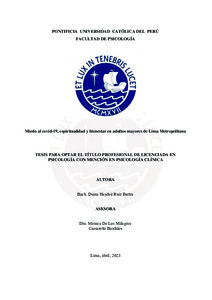| dc.contributor.advisor | Cassaretto Bardales, Mónica De Los Milagros | |
| dc.contributor.author | Ruiz Bartra, Bach. Diana Haydeé | |
| dc.date.accessioned | 2023-10-26T20:02:15Z | |
| dc.date.available | 2023-10-26T20:02:15Z | |
| dc.date.created | 2023 | |
| dc.date.issued | 2023-10-26 | |
| dc.identifier.uri | http://hdl.handle.net/20.500.12404/26243 | |
| dc.description.abstract | Desde su surgimiento hace más de tres años, la pandemia de la covid-19 ha generado
impactos en todos los aspectos de la vida de los individuos. En este contexto, merece
particular atención la salud mental de quienes representaron el grupo etario más
vulnerable frente a sus consecuencias físicas, psicológicas y sociales. Este es el caso de
los adultos mayores (Ferre & Abou Rafeh, 2020). En base a ello, la presente investigación
tuvo como objetivo estudiar las relaciones entre el miedo a la covid- 19, la espiritualidad
y el bienestar de una muestra de 169 adultos mayores limeños durante el primer año de
la emergencia sanitaria. Para medir el temor a la covid-19 se utilizó la FCV-19S (Ahorsu
et al., 2020); para el bienestar, las escalas de Florecimiento, SPANE-P y SPANE-N
(Diener et al., 2010); y para la espiritualidad, el SBI-15R (Holland et al., 1998). Los
resultados sugieren relaciones significativas y coherentes entre el miedo a la covid-19 y
todas las medidas de bienestar. Así también, se halló una relación directa y significativa
entre la espiritualidad y la afectividad positiva. Respecto a la capacidad explicativa de las
variables de medición del bienestar de la muestra, los modelos de regresión revelaron que
miedo a la covid-19, nivel de deterioro de la salud percibido y espiritualidad eran las
variables que más explicaban la afectividad positiva (R2=19, p<.05). Por su parte, miedo
a la covid-19 y diagnóstico de covid-19, fueron las más explicativas de la afectividad
negativa (R2=.33, p<.001). | es_ES |
| dc.description.abstract | Since its emergence more than three years ago, the covid-19 pandemic has had an impact
on all aspects of the lives of individuals. In this context, the mental health of those who
represent the most vulnerable age group in the face of its physical, psychological and
social consequences deserves special attention. This is the case of older adults (Ferre &
Abou Rafeh, 2020). Based on this, the objective of this research was to study the
relationships between fear of covid-19, spirituality, and well-being in a sample of 169
older adults from Lima in the first year of the health emergency. To measure fear of covid-
19, the FCV-19S was obtained (Ahorsu et al., 2020); for well-being, the Flourishing,
SPANE-P and SPANE-N scales (Diener et al., 2010); and for spirituality, the SBI-15R
(Holland et al., 1998). The results suggested significant relationships and consistency
between fear of covid-19 and all measures of well-being. Likewise, a direct and
significant relationship was found between spirituality and positive affectivity. Regarding
the explanatory capacity of the well-being measurement variables in the sample, the
regression fear models revealed that in the face of covid-19, the level of perceived
deterioration in health and spirituality were the variables that most explained positive
affectivity (R2= 19, p<0.05). For their part, fear of covid-19 and diagnosis of covid-19
were the most explanatory of negative affectivity (R2=.33, p<.001). | es_ES |
| dc.language.iso | spa | es_ES |
| dc.publisher | Pontificia Universidad Católica del Perú | es_ES |
| dc.rights | info:eu-repo/semantics/openAccess | es_ES |
| dc.rights.uri | http://creativecommons.org/licenses/by-sa/2.5/pe/ | * |
| dc.subject | Salud mental--Perú--Lima Metropolitana--Aspectos psicológicos | es_ES |
| dc.subject | Adultos mayores--Perú--Lima Metropolitana--Aspectos psicológicos | es_ES |
| dc.subject | Pandemia de COVID-19, 2020- --Perú--Lima Metropolitana--Aspectos psicológicos | es_ES |
| dc.title | Miedo al covid-19, espiritualidad y bienestar en adultos mayores de Lima Metropolitana TESIS | es_ES |
| dc.type | info:eu-repo/semantics/bachelorThesis | es_ES |
| thesis.degree.name | Licenciado en Psicología con mención en Psicología Clínica | es_ES |
| thesis.degree.level | Título Profesional | es_ES |
| thesis.degree.grantor | Pontificia Universidad Católica del Perú. Facultad de Psicología | es_ES |
| thesis.degree.discipline | Psicología con mención en Psicología Clínica | es_ES |
| renati.advisor.dni | 09491245 | |
| renati.advisor.orcid | https://orcid.org/0000-0002-4880-6092 | es_ES |
| renati.author.dni | 77700147 | |
| renati.discipline | 313026 | es_ES |
| renati.juror | Cassaretto Bardales, Mónica de los Milagros | es_ES |
| renati.juror | Gargurevich Liberti, Rafael Erenesto | es_ES |
| renati.juror | Mogrovejo Sanchez, Jose Amilcar | es_ES |
| renati.level | https://purl.org/pe-repo/renati/level#tituloProfesional | es_ES |
| renati.type | https://purl.org/pe-repo/renati/type#tesis | es_ES |
| dc.publisher.country | PE | es_ES |
| dc.subject.ocde | https://purl.org/pe-repo/ocde/ford#5.01.00 | es_ES |







